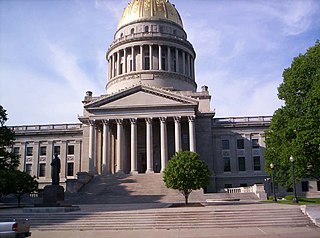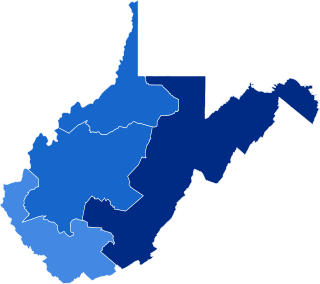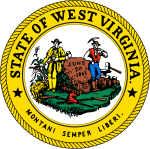
The Solid South was the electoral voting bloc for the Democratic Party in the Southern United States between the end of the Reconstruction era in 1877 and the Civil Rights Act of 1964. During this period, the Democratic Party controlled southern state legislatures and most local, state and federal officeholders in the South were Democrats. During the late 19th century and the early 20th century, Southern Democrats disenfranchised nearly all blacks in all the former states of the Confederate States of America. This resulted in a one-party system, in which a candidate's victory in Democratic primary elections was tantamount to election to the office itself. White primaries were another means that the Democrats used to consolidate their political power, excluding blacks from voting.

The 2000 United States House of Representatives elections were held on November 7, 2000, to elect U.S. Representatives to serve in the 107th United States Congress. They coincided with the election of George W. Bush as President of the United States. The Republican Party won 221 seats, while the Democratic Party won 212 and independents won two.

From the time of the Great Depression through the 1990s, the politics of West Virginia were largely dominated by the Democratic Party. In the 2000 presidential election, George W. Bush claimed a surprise victory over Al Gore, with 52% of the vote; he won West Virginia again in 2004, with 56% of the vote. West Virginia is now a heavily Republican state, with John McCain winning the state in 2008, Mitt Romney in 2012 and Donald Trump in 2016, 2020, and 2024.

The 2008 United States Senate election in West Virginia was held on November 4. Incumbent senator Jay Rockefeller won re-election to a fifth term in a landslide, defeating Republican Jay Wolfe who had returned from the 2002 Senate election by a 27-point margin. Despite this overwhelming win, this remains the last time that a Democrat has won West Virginia's Class 2 U.S. Senate seat. In both of the two subsequent elections for the seat, Republicans have swept every single county.
Alyson Kennedy is an American activist and member of the Socialist Workers Party (SWP). A perennial candidate, she was a candidate in the 2019 Dallas mayoral election. She was the SWP's nominee for Vice President in the 2008 United States presidential election, President in the 2016 United States presidential election as well as their nominee for president in 2020.

The 2008 United States presidential election in Virginia took place on November 4, 2008, which was part of the 2008 United States presidential election. Voters chose 13 representatives, or electors to the Electoral College, who voted for president and vice president.
Donald "Bud" Cook is a Republican member of the Pennsylvania House of Representatives, who has represented the 50th District since 2023. Prior to redistricting, Cook represented the 49th District from 2017 to 2022.

The 1956 United States Senate special election in West Virginia took place on November 6, 1956, to elect a U.S. Senator to complete the unexpired term of Senator Harley M. Kilgore, who died on February 28. 1956. State Tax Commissioner William Laird III was appointed to fill this seat by Governor William C. Marland to fill the vacancy until a special election could be held and assumed office on March 13, 1956.

The 1988 United States House of Representatives elections in West Virginia were held on November 8, 1988, to determine who will represent the state of West Virginia in the United States House of Representatives, with primary elections taking place on May 10. West Virginia had four seats in the House, apportioned according to the 1980 United States census. Representatives are elected for two-year terms.

Donna Mummau Rozar is an American businesswoman, nurse, and Republican politician from Marshfield, Wisconsin. She served two terms as a member of the Wisconsin State Assembly, representing Wisconsin's 69th Assembly district from 2021 to 2025. She is also a member of the board of supervisors of Wood County, Wisconsin, since 2000.

The 1998 West Virginia Senate election took place on Tuesday, November 3, 1998. State senate seats in West Virginia are staggered, with senators serving 4-year terms. 18 of the 34 state senate seats were up for election, with SD 2 holding an additional special election for Larry Wiedebusch's seat, who died on October 25, 1997. Jeffrey V. Kessler was appointed to fill the seat and was re-elected by a wide margin. The election took place concurrently with the U.S. House elections. The Democratic Party won over 60% of the vote for state senate candidates and flipped 4 Republican seats, retaining a supermajority in the state legislature's upper chamber.

The 2002 West Virginia Senate election took place on Tuesday, November 5, 2002, to elect members of the 76th Legislature. 17 of the 34 state senate seats were up for election. State senate seats in West Virginia are staggered, with senators serving 4-year terms. The election took place concurrently with the U.S. House elections. The Democratic Party won over 60% of the vote for state senate candidates, retaining a supermajority, but lost 4 seats to Republicans.

The 2004 West Virginia Senate election took place on Tuesday, November 2, 2004, to elect members to the 77th and 78th Legislatures; held concurrently with the presidential, U.S. House, and gubernatorial elections. State senate seats in West Virginia are staggered, with senators serving 4-year terms. 17 of the 34 state senate seats were up for election. While Republican candidate for George W. Bush won the state in the presidential election by 13 points, the Democratic Party won a majority of the vote for state senate candidates. Republicans managed to flip 3 seats, chipping away at the Democrats' supermajority.

The 2006 West Virginia Senate election took place on Tuesday, November 7, 2006, to elect members to the 78th and 79th Legislature. 17 of the 34 state senate seats were up for election. State senate seats in West Virginia are staggered, with senators serving 4-year terms. The election took place concurrently with the U.S. House and U.S. Senate elections. The Democratic Party won over 60% of the vote for state senate candidates and picked up 2 seats held by Republicans, retaining their supermajority. While President George W. Bush won the state in the previous presidential election, Democrats did well across the country and the state in a year described as a blue wave.

The 2008 West Virginia Senate election took place on Tuesday, November 4, 2008, to elect members to the 79th and 80th Legislatures; held concurrently with the presidential, U.S. House, U.S. Senate, and gubernatorial elections. State senate seats in West Virginia are staggered, with senators serving 4-year terms. 17 of the 34 state senate seats were up for election. While Republican candidate for John McCain won the state in the presidential election by 13 points, the Democratic Party won over 60% of the vote for state senate and flipped 3 Republican seats, expanding the Democrats' supermajority.

The 2010 West Virginia Senate election took place on Tuesday, November 2, 2010, to elect members to the 80th and 81st Legislatures; held concurrently with the U.S. House and U.S. Senate elections. State senate seats in West Virginia are staggered, with senators serving 4-year terms. 18 of the 34 state senate seats were up for election. 17 were regularly scheduled, with an additional special election in SD 10 after the death of Donald Caruth on May 1, 2010. John H. Shott was appointed to fill the seat, and Mark Wills was elected to finish the term. While Republicans made huge gains across the country, Democrats did well in the state senate, picking up two Republican seats.

The 2012 West Virginia Senate election took place on Tuesday, November 6, 2012, to elect members to the 81st and 82nd Legislatures; held concurrently with the presidential, U.S. House, U.S. Senate, and gubernatorial elections. State senate seats in West Virginia are staggered, with senators serving 4-year terms. 17 of the 34 state senate seats were up for election. While Republican candidate for president Mitt Romney won the state in the presidential election by over 26 points, the Democratic Party won over 60% of the vote for state senate candidates, though they lost 3 seats. As of 2023, this is the last state senate election in which Democrats won a majority of seats.

The 2014 West Virginia Senate election took place on Tuesday, November 4, 2014, to elect members to the 82nd and 83rd Legislatures; held concurrently with the U.S. House, and U.S. Senate elections. State senate seats in West Virginia are staggered, with senators serving 4-year terms. 17 of the 34 state senate seats were up for election. The Republicans won in a landslide, flipping 8 Democratic seats and securing a majority in the chamber after the defection of Democratic senator Daniel Hall the day after the election.

The 1996 West Virginia Democratic presidential primary was held on May 12 in the U.S. state of West Virginia as one of the Democratic Party's statewide nomination contests ahead of the 1996 presidential election.





















